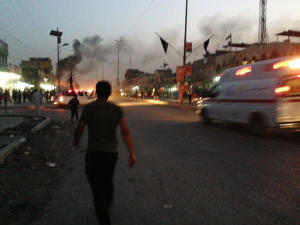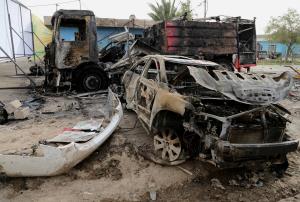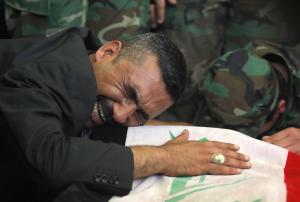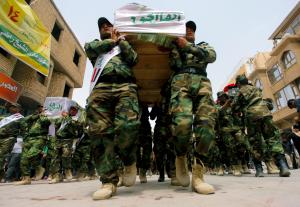Dark days for Baghdad on eve of Iraqi elections
BAGHDAD (AP) — Blast barrier walls topped with barbed wire snake across the Iraqi capital, encircling government buildings like a fortress and enshrining the separation of neighborhoods increasingly divided by religious sect. Soldiers and policemen brandishing assault rifles and machine guns man checkpoints, partially hidden behind sandbags or staring down from the roofs of Humvees.
As parliamentary elections are held this week more than two years after the withdrawal of U.S. troops, Baghdad is once again a city gripped by fear and scarred by violence. Many of the city's 7 million residents avoid roads hit by bombings, fearing a deadly repeat. Most shops now close shortly after sunset, and an overnight curfew that begins at midnight remains in force.
On Monday, suspected Sunni militants struck checkpoints outside polling stations across Baghdad and much of the country, as army and police personnel voted two days before the rest of Iraq's 22 million registered voters cast their ballots on Wednesday. At least 21 people were killed in the suicide bombings and other attacks.
Despite a surge in violence engulfing the country over the past year, Prime Minister Nouri al-Maliki's election coalition is expected to win and propel him to a third, four-year term in office. Al-Maliki's campaign has cast him as a strong statesman who has kept the country together through tough times, a view rejected by many Sunnis who see him as a sectarian politician determined to marginalize their once-dominant sect.
An al-Qaida breakaway group, the Islamic State in Iraq and the Levant, is challenging the authority of the Shiite-led government, waging a campaign of terror on ordinary Shiites in Baghdad and elsewhere. The Sunni militants also control parts of the vast Anbar province west of Baghdad and maintain a heavy presence in the north and northeast of the country. Their campaign is fueled by the frustration felt by many Sunni Arabs that they are now being denied government jobs slotted for less qualified Shiites.
Baghdad's division along sectarian lines, a legacy of the last decade's Sunni-Shiite bloodletting, is now deeply enshrined and, to hardliners on both sides, is how things should be. Most of the hundreds of thousands of mostly Sunni Baghdadis who fled the capital have yet to come back, finding relative peace abroad in Arab cities like Amman, Dubai and Beirut.
A flood of migrants from the impoverished and mainly Shiite south of the country has altered Baghdad's demographics. Many Sunnis now complain that what was once a diverse city with entrenched values of religious tolerance is now predominantly Shiite. Mixed neighborhoods are disappearing, and where they do still exist, minority residents complain of harassment and intimidation. Interfaith marriages are now rare among poor Shiites and Sunnis.
Some of the campaign posters for Wednesday's parliamentary election are promising better days for the city — jobs, security and an end to graft. But many residents don't believe such promises, instead distrusting politicians as corrupt or inept.
"It is only now that it is election season that we hear from politicians," said Zeid Ibrahim Ahmed, a 47-year-old Sunni barber from Baghdad's mostly Sunni Azamiyah neighborhood. "But for four years they failed to do anything useful. The only change we might see in Iraq after the election is that we will move from bad to worse."
Ahmed said he keeps his three children at home and away from school on days when bombs go off. When they do go, he escorts them.
"Security is worsening every day in this city," he said.
Some Shiites share the Sunnis' frustration over deteriorating security and the failure of al-Maliki's government to improve their lives despite the country's vast oil wealth. But many also see him as a strong leader who can protect and perpetuate Shiite domination.
Once the glorious capital of a prosperous and vast medieval empire, Baghdad has endured hard times since its ruinous war with neighboring Iran began in 1980 — though nothing has changed the city so much as the forces set in motion by the U.S. invasion and ouster of longtime Sunni dictator Saddam Hussein in 2003.
There is little left of the secularism that defined Baghdad in the 1960s and 1970s, when art, theater and literature flourished and the city became a magnet for artists from across the Arab world. The city became more culturally conservative as Saddam launched a "faith campaign" after a U.S.-led coalition threw Iraq's army out of Kuwait in 1991 and enforced U.N. sanctions on the energy-rich nation. Now, there are no more than a handful of theaters and no movie theaters.
Ironically, there has been a simultaneous explosion of seedy night clubs frequented by prostitutes and the city's new rich class — mostly young men who land lucrative government contracts through connections and corruption.
The sight of government buildings damaged by U.S. airstrikes in the 2003 war continues to punctuate the city's skyline, and a housing crunch has led to illegal construction that turned leafy, upper middle-class neighborhoods into concrete jungles.
Buildings of significant historical value have been left to decay despite the nation's vast oil wealth. The Ottoman era Al-Rasheed street in the heart of the capital is now home to auto repair shops. The nearby Mustansiyria school, built in the 13th century, is closed to the public; the area outside it has been turned into a garbage pit.
Mahmoud al-Obeidi, a 72-year-old pensioner from the Azamiyah district, nostalgically recalls life in his city in the 1970s.
"In most of the city's streets, we could see workers repairing roads, electricity lines and water pipes," he said. "People had power at their houses 24 hours a day and safe drinking water. At night, Baghdad was full of lights — cinemas, theaters and night clubs," said al-Obeidi, a Sunni who bemoaned that he is frightened he might be killed by militiamen if he went to visit lifelong Shiite friends in other parts of the city.
"I was born in a beautiful and united city called Baghdad," al-Obeidi said. "Now I fear that I will die in a divided and destroyed city."
Some of the hundreds of army and police checkpoints spread across the city fly religious Shiite flags, with images of the sect's most revered saint, the 7th century Imam Hussein, adorning banners.
In many ways, Iraq's sectarian conflict is a reflection of the civil war raging in neighboring Syria, where the regime of President Bashar Assad, a follower of a Shiite offshoot sect, is battling mostly Sunni rebels whose ranks are dominated by Islamists and militants from al-Qaida-inspired or linked groups. Significantly, fighters from the Islamic State of Iraq and the Levant have joined the ranks of the Syrians rebels, while Shiite Iraqi militiamen are fighting on Assad's side. The cross-border involvement is thought to be stoking Iraq's sectarian tensions.
Still, some Baghdadis insist the current bout of violence is not quite where it was in 2006 and 2007, when each morning brought the discovery of dozens more bodies of Sunnis or Shiites who had been kidnapped by militants of the rival sect, sometimes tortured with an electric drill, shot execution-style, decapitated and dumped in remote parts of the city or in the Tigris.
That gruesome practice has returned, though the number of such attacks remains well below what it was during the worst of the war. Nevertheless, Sunnis and Shiites are still too afraid to visit neighborhoods dominated by the rival sect after dark. In some cases, they are afraid to go during the day as well.
In at least one sense, the fear gripping Baghdad is worse now because of the seemingly random selection of targets. In recent weeks, bombs went off in popular ice cream parlors, hamburger joints, supermarkets, football fields, outdoor markets, cafes, restaurants and mosques.
"They strike to kill wherever they wish," said Atta Zeidan, co-owner of a bookshop along al-Mutanabi street. "The one thing they may not have done yet is to booby trap the air we breathe."
___





No comments:
Post a Comment